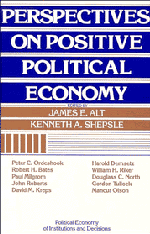Editors' introduction
Published online by Cambridge University Press: 05 July 2011
Summary
POSITIVE POLITICAL ECONOMY
Recent advances in interdisciplinary research in economics and politics have created the field of positive political economy. This new research tradition is distinct from both normative and historical approaches to political economy. The former emphasizes value judgments about the distribution of wealth and power and derives optimal outcomes or arrangements according to postulated standards of evaluation. The latter focuses atheoretically on thick historical description. In contrast, positive political economy, on the one hand, seeks out principles and propositions against which actual experience can be compared in order to understand and explain, not judge, that experience. On the other hand, although ultimately interested in real phenomena, positive political economy is explicitly theoretical. Its focus is on microfoundations, and it is grounded in the rational-actor methodology of microeconomics. Thus, its most distinguishing characteristics are its coherent and unified theoretical view of politics and economics, its strongly interdisciplinary nature, and its concern with explaining empirical regularities.
Moreover, in contrast to either of the separate fields of economics and political science, positive political economy emphasizes both economic behavior in political processes and political behavior in the marketplace. In emphasizing the former it uses an economic approach – constrained maximizing and strategic behavior by self-interested agents – to explain the origins and maintenance of political institutions and the formulation and implementation of public policies. In emphasizing the latter it stresses the political context in which market phenomena take place.
- Type
- Chapter
- Information
- Perspectives on Positive Political Economy , pp. 1 - 6Publisher: Cambridge University PressPrint publication year: 1990
- 3
- Cited by



